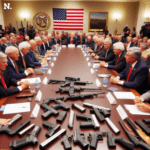Two Chinese individuals have been accused of a complex plot to illegally export semiconductor-related apparatus from the United States to China, highlighting the ongoing fight against illicit technology transfer. This development highlights the ongoing battle against illicit technology transfer. In a time of geopolitical unrest, the lawsuit, which is being heard in federal court in San Francisco, highlights the need to protect critical technology and throws light on attempts to get around export restrictions.
The Allegations for Illegal Export
Han Li, 44, and Lin Chen, 64, are the targets of several accusations made by federal prosecutors against them, alleging that they violated the Export Administration Regulations (EAR) and the International Emergency Economic Powers Act (IEEPA). Their alleged involvement in an attempt to export a machine that is essential for semiconductor processing to Changdu Gastone Technology Corporation, a Chinese corporation that is listed on the Department of Commerce’s Entity List, is the basis for the allegations.
The Machinery at the Heart of the Scheme
Dynatex International, a California-based corporation, manufactures the DTX-150 Automatic Diamond Scriber Breaker Machine, which is the central component of the alleged plan. Because of its crucial significance in the production of semiconductors, this equipment, which is necessary for cutting thin semiconductors known as silicon wafers, is subject to strict export controls.
The Covert Operations
Li and Chen are alleged to have carried out many clandestine operations between May 2015 and August 2018 to acquire the DTX-150 machine for Changdu Gastone Technology Organization. They used Jiangsu Hantang International (JHI) as an intermediary business, posing as the buyer and final user of the machinery, to avoid being discovered. This dishonest strategy was intended to hide the fact that the transaction involved a banned Chinese business.
The Legal Ramifications
Li and Chen are both accused of the following crimes, for which they could be punished to the furthest extent possible if found guilty: Smuggling can result in up to 10 years in jail and a $250,000 fine; conspiracy to violate the IEEPA can result in up to 20 years in prison and a $1 million punishment; and false electronic information activities can result in up to five years in prison and a $250,000 fine. The United States Sentencing Guidelines and other statutory considerations will be taken into account by a federal district court judge before determining any punishment.
The National Security Imperative
Export regulations must be strictly enforced, according to US authorities, in order to reduce the possibility of unapproved technology transfers endangering national security. The indictment is indicative of a determined attempt to counteract illegal procurement activities that seek to obtain technologies created in the United States for forbidden end users, especially those with potential military uses.
The Global Technological Competition
The case illustrates both the growing rivalry in cutting-edge technical fields and broader geopolitical factors. In light of the escalating hostilities between the United States and China, both countries are making greater efforts to maintain their technological superiority, competing for primacy in vital industries like chip manufacturing.
The Enforcement Efforts
The FBI, Homeland Security Investigations, and the Bureau of Industry and Security of the Department of Commerce are among the law enforcement organizations that have led the investigations into the purported smuggling operation. Their combined efforts highlight the importance of using a multi-agency strategy to enforce export control regulations and stop the unlawful transfer of technology.
The case serves as a reminder of the difficulties associated with unauthorized technology transfer and the need for strong enforcement actions to protect national security interests as the judicial proceedings progress. In a time of technical competition and strategic rivalry, the fight to restrict unauthorized access to critical technologies continues to be a key component of U.S. policy as technology shapes geopolitical dynamics more and more.





